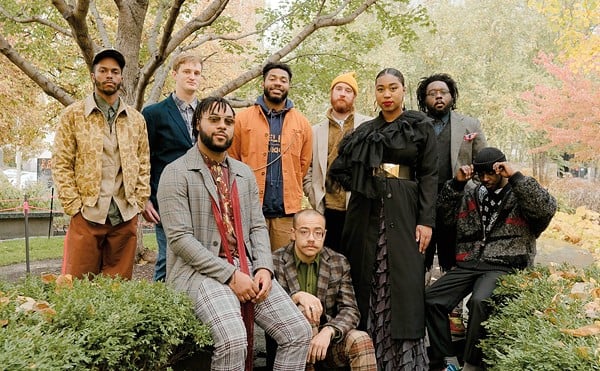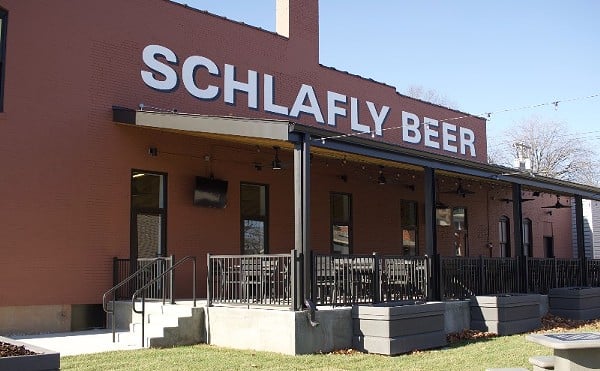On Saturday the world's foremost Woody Guthrie scholars gathered at the University of Tulsa to discuss how Guthrie's Oklahoma roots shaped his music and the Sooner State musicians who've followed in his footsteps. "Different Shades of Red: Woody Guthrie and the Oklahoma Experience at 100" is the first of five academic symposiums that will explain Guthrie's legacy this year.
Symposium Committee Chair Brian Hosmer promised that no American musician had ever been celebrated as Guthrie would be that day, and that he hopes the celebration and examination of the legend's life might spur similar events for the milestone birthdays of other musicians who shaped American music.
The first panel discussion, "A Culture of Protest", looked at the political environment in Oklahoma around the time of Guthrie's 1912 birth. Worth Robert Miller of Missouri State University began with, Struggle for the Promised Land: Oklahoma's Territorial Years, noting that what is now "the reddest of the red states", Oklahoma was a Socialist stronghold when it became a state five years before Guthrie's birth. Oklahoma was a territory for homesteaders, which created a hostile environment between exploitative land-owners and tenant farmers. In the twenty years prior to Guthrie's birth, the Populist political movement arose in the lower classes in response to the predatory lending practices and unfair sharecropping deals. This created a culture of organization, unions, and political cooperation that set the stage for Guthrie and colored his songs "Pretty Boy Floyd" ("Some will rob you with a six-gun, and some with a fountain pen.") and "Jesus Christ" ("When Jesus come to town, all the working folks around/Believed what he did say/But the bankers and the preachers, they nailed Him on the cross,/And they laid Jesus Christ in his grave.")
Guthrie's father, Charlie, was the former, a real estate speculator who eventually ran the family from a solid middle-class standing into poverty through land deals gone bad over the course of Guthrie's childhood. The family was homeless and destitute by the time Guthrie was in his mid-teens.
Jim Bissett from Elon Univeristy followed with Demanding Democracy: The Socialist Movement and Oklahoma Politics, and illustrated just how strong the Socialist movement was in Oklahoma. Woodrow Wilson captured the most votes in Oklahoma during the 1912 presidential election, but Guthrie's home county of Okfuskee gave more votes to Socialist candidate Eugene Debs than to Woodrow Wilson and William Howard Taft combined. Okfuskee County was experiencing the "Agriculture Crisis" at the time, caused by artificially low prices for crops, inflated prices for farm necessities, and the highest foreclosure rate in American history.
Instead of focusing on the growing poverty in the Midwest, politicians - who were often land-owners - focused instead on social issues. "Thank God that doesn't happen anymore," said Bissett.
The Socialist Party grew in response to the Agriculture Crisis being ignored by mainstream politics, pushing Republicans and Democrats to face the economic hardships that left Oklahoma tenant farmers with a worse quality of life than New York City sweatshop workers and creating a culture of protest in their wake.
Oklahoma Socialists didn't share the same beliefs as the national Socialist Party, which viewed all land owners as being bourgeois. In Oklahoma, Socialists recognized that most farmers who owned the land they worked lived in abject poverty. Instead of tying class to ownership, they tied it to physical labor. In 1912 the national Socialist Party revised their stance after being challenged by the Oklahoma Socialists.
Also, the evangelical culture in the rural Midwest colored their brand of Socialism. To the cheers of the audience, Bissett said that Jesus preached Socialist ideas, and that the Bible says this land is ours.
Sound familiar? It should. Guthrie identified as a Christian who lived by the Golden Rule.
The panel concluded with Jame Green of the University of Massachusetts presenting Something in the Air: Persistent Dissent in Oklahoma During Woody Guthrie's Boyhood and Early Manhood, where he asked if Oklahoma radicalized Guthrie, or if it happened when he traveled to California in the early 1930s and saw the plight of his fellow Oklahoma migrant workers.
Green touched on Guthrie's fictionalized biography, "Bound for Glory", pointing out that instead of writing about his father's hatred of Socialists, he opted to describe him simply as a "fighter". But Charlie Guthrie was a conservative Democrat who ran for local office with Woody and his siblings campaigning for him in 1922.
By 1930 Guthrie's family had split and he followed his father to Pampa, Texas, in search of an oil boom job. Instead he made friends with musician Matt Jennings and started writing songs about the people working in the oil fields. At the same time Texan Gene Autry, a union telegrapher at the time, composed "The Death of Mother Jones" to mark the passing of the 100-year-old labor leader.
Fellow Oklahoman Will Rogers was finding fame at the same time as a humorist and social commentator. Before his 1935 death Rogers, who Guthrie admired, said that the Great Depression was caused by the rich who made their money from the hard work of others, a system that needed to change. Guthrie and Jennings agreed, and started investigating Socialism for themselves.
When Guthrie composed "This Land is Your Land" in 1940, he included verses that were often dropped from the song as it became a patriotic anthem over the decades. In 1964 with his health degenerating to Huntington's Disease, Guthrie taught his son Arlo the omitted verses for fear that they'd die with him:
As I went walking I saw a sign there And on the sign it said "No Trespassing." But on the other side it didn't say nothing, That side was made for you and me.
Nobody living can ever stop me, As I go walking that freedom highway; Nobody living can ever make me turn back This land was made for you and me. In the squares of the city, In the shadow of a steeple; By the relief office, I'd seen my people. As they stood there hungry, I stood there asking, Is this land made for you and me?
The second panel discussion, "Red Dirt Roots" covered the Oklahoma-bred subgenre of music that sprung up after Guthrie's death. Music writer Thomas Connor of the Chicago Sun-Times compared it to alt country and Americana movements in other parts of the country during his presentation, Oklahoma's Red Dirt Music and its Debt to Woody. In 1972 Jesse Ed Davis from the Stillwater, Oklahoma-based band Moses described Red Dirt as "A hue of funk, a shade of sound, a basic spirit," taking inspiration from Hank Williams, Chuck Berry, and Guthrie protege Bob Dylan. The themes in the music reflect the same humor mixed with rural decay that Guthrie used in his compositions.






